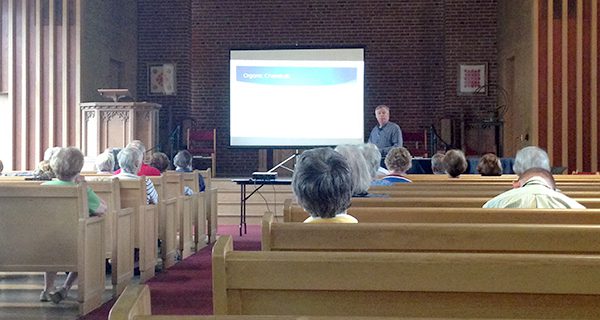[ccfic caption-text format="plaintext"]
By James Ensor
Hometown Weekly Reporter
William Shaughnessy gave a fascinating talk on the challenges and opportunities involved in the process of ensuring a safe water supply on the morning of Monday, September 19. The Wellesley-Weston Lifetime Learning program sponsored the lecture as part of its larger program designed to provide seniors from all communities with the chance to continue learning. Audience members gathered at the Unitarian Universalist Society of Wellesley Hills by the dozens to hear the highly relevant talk, given our drought conditions.
Topics covered by Shaughnessy ranged widely. He spoke about the treatment process, which involves the oxidation, pH adjustment, filtration, aeration, chlorination and disinfection of local water, informing the audience that the treatment plants in Wellesley came online in 1998. The multi barrier approach to public health protection was also addressed. Barriers are erected between potential health threats and consumers before the water supply reaches the public. These barriers include the reduction of initial contamination in watersheds, water treatment, rigorous training for water treatment plant operators, and properly designed facilities for treatment and distribution.
Shaughnessy brought up an interesting anecdote when he told the audience that “in 1900, there was a big debate about putting chlorine in the water, because at high enough levels, it is poisonous. However, waterborne diseases have been significantly reduced because of its introduction. The dosage makes the poison.”
The talk concluded with a discussion on how lead has been phased out of the water supply system, Wellesley has no lead pipes in a distribution system of 150 miles of pipe, 8,500 service connections, 1,300 fire hydrants, 10 wells and 3 filtration plants. The next talk in this series of lectures, labeled “American Issues”, was scheduled for September 26, and was given by the Honorable Raymond J. Brassard, Massachusetts Superior Court Judge.





















